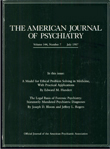Behavioral and neuroendocrine responses to m-chlorophenylpiperazine in subtypes of alcoholics and in healthy comparison subjects
Abstract
OBJECTIVE: The purpose of this study was to explore central serotonergic functions in subgroups of alcoholics and in healthy comparison subjects. METHOD: The mixed serotonin (5-HT) agonist/antagonist m-chlorophenylpiperazine (m-CPP) was administered to male alcoholic patients who were classified according to the criteria of von Knorring et al. as type I alcoholics (late onset) (N = 16) or type II alcoholics (early onset with antisocial traits) (N = 24) and to 22 healthy comparison subjects. Psychological, physiological, and neuroendocrine measures were obtained before and after the m-CPP infusion. RESULTS: m-CPP elicited subtype-related differential effects among the alcoholics; the type I alcoholics reported more anger and anxiety, and the type II alcoholics reported increased euphoria and a greater likelihood of drinking. The healthy comparison subjects exhibited a greater increase in plasma ACTH response to the m-CPP infusion than the alcoholics regardless of subtype. CONCLUSIONS: Differences in certain 5-HT receptor functions may explain some of the clinical characteristics that differentiate the type II and type I subgroups of alcoholic patients. Furthermore, alcoholics may have reduced sensitivity of 5-HT2C receptors in comparison with healthy subjects.



